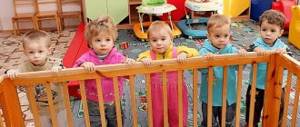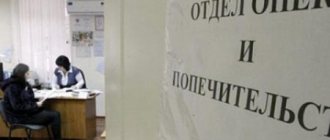Russian laws, in the absence of restrictions, recognize citizens who have reached the age of 18 as fully capable. Until this age, in the absence of emancipation, children are more or less legally limited in their civil rights. These restrictions are compensated by the child’s lesser responsibility compared to capable citizens.
Representatives act on behalf of and in the interests of minors where their own rights are limited. In this article we will figure out who is the legal representative of a child in Russia. If you have problems exercising the rights of a minor's legal representative, seek legal assistance.
Who is responsible for the child?
Persons responsible for the actions of minors are specified in the Civil Code of the Russian Federation:
- parents;
- guardians;
- trustees;
- employees of organizations for children left without representatives;
- medical personnel of clinics and other health care institutions where a minor is being treated;
- employees of educational organizations where the child is studying;
- other persons whose duties include supervising minor citizens - if the unlawful act occurred during the period of supervision.
After the age of 16 and until reaching adulthood, the child bears independent responsibility for illegal actions. However, if there are no means to compensate for the harm caused, the responsibility to satisfy legal claims extends to the parents or guardians.
Important: the responsibility of the mother and father remains even if they have been deprived of parental rights - compliance with this rule is relevant for a three-year period after the relevant court decision is made.
According to the legislative authorities, the desire of a minor to commit illegal acts is primarily due to improper upbringing. That is, it was the parents’ position towards their own child before the deprivation of their rights that became the reason for the minor to commit an illegal act - it was as a result of the wrong actions of the representative that a tendency towards antisocial behavior was formed.
During the period of a child’s stay in educational, supervisory, medical or other institutions of a similar nature, employees of these organizations bear responsibility for them. In the case of minors committing unlawful acts, authorized persons are found guilty and are subject to certain penalties for improper performance of assigned duties.
For example, if a student of an educational institution decided to skip school, and at that time he committed theft from a store, educational workers are considered responsible. Failure to comply with the established regulations is considered a violation. Thus, if a student is absent, teachers must notify parents or law enforcement. The same obligation is assigned to employees of a kindergarten, entertainment center, etc.
However, in some situations, the administration of the institution can avoid liability if it proves that the unlawful act was committed in connection with the poor upbringing of the child. Then the fulfillment of claims for damages falls on the parents.
Until what age does a child legally have to live with his parents?
The fact that minor parents do not have their own income does not in itself exempt them from this obligation, but may have an impact on the amount of maintenance, and if they do not have property that can be seized, they may be released from this obligation (Article 119 of the Family Code RF)
You may like => The amount of debt at which it is possible to seize property
The responsibility to support their minor children is also assigned to persons recognized by the court as incompetent, and is fulfilled from the funds available to them by their guardians, medical institutions or institutions of the social protection system in which they are located. This obligation does not depend on the parents having the necessary funds.
Parental responsibilities
In order to understand when a child’s legal representatives have an inappropriate attitude towards his upbringing, it is worth clarifying the positions that they must fulfill in accordance with the norms of the Family Code of the Russian Federation:
- personal participation in the development and education of one’s own child;
- the use of educational methods that do not contradict the law, the interests of children and their safety;
- promoting the successful psychological, physiological and spiritual development of the child;
- creation of conditions necessary for the full provision of minors;
- protecting the rights of the ward in courts and other institutions where the participation of a representative is necessary.
In fact, parents are obliged to promote the comprehensive development of the child, support and guide him in difficult situations, and explain what is good and what is bad. Therefore, if a minor violates the established norms of the law and society, his mother and father will be primarily responsible, because antisocial behavior is a consequence of their actions or inaction.
Article 63
Paragraph 1 of this article establishes that parents have the right to raise their children. The granted right is a personal, inalienable right of each parent. It lies in the fact that the parent is given the right to personally raise his children. At the same time, they are free to choose methods and methods of education that are consistent “with the developing abilities of the child” (Clause 2 of Article 14 of the Convention on the Rights of the Child).
You may like => Contents of Prosecutorial Supervision over the Activities of the Bodies of Inquiry and Preliminary Investigation
2. According to Part 1 of Art. 28 of the Convention on the Rights of the Child, States Parties recognize the child’s right to education and, with a view to progressively achieving the realization of this right on the basis of equal opportunity, they, in particular: a) introduce free and compulsory primary education; b) encourage the development of various forms of secondary education, both general and vocational, ensure its accessibility for all children and take such necessary measures as the introduction of free education and the provision of financial assistance in case of need; c) ensure that higher education is accessible to all, based on each individual's abilities, through all necessary means; d) ensure that education and training information and materials are accessible to all children; (e) take measures to promote regular school attendance and reduce school dropout rates. States Parties shall take all necessary measures to ensure that school discipline is maintained in a manner consistent with the human dignity of the child and in accordance with this Convention (Article 28(2) of the Convention on the Rights of the Child).
Bringing parents to criminal liability for the actions of a child
In accordance with Art. 20 of the Criminal Code of the Russian Federation, a minor can be held accountable for a criminal act on a general basis, starting from the age of 16 . However, if he commits a particularly serious crime, penalties can be implemented from the age of 14 . Such illegal acts include:
- murder committed intentionally;
- participation in terrorist activities;
- committing violent acts of a sexual nature;
- intentional infliction of grievous bodily harm;
- stealing someone else's property.
, maximum penalties are not applied
to persons aged 14 to 16 years
When making a decision, the court takes into account the following factors:
- accommodations;
- family relationships;
- features of upbringing;
- availability of education and degree of mental development;
- physiological and psychological state;
- The child’s sanity is also assessed, for which the latter must undergo a forensic medical examination.
During interrogation, as well as during court proceedings, the presence of legal representatives is required. As practice shows, children who have committed a criminal offense are raised in conditions where parents simply do not pay attention to the life and interests of their children. In such cases, the mother and father face liability under Art. 156 of the Criminal Code of the Russian Federation , according to which the following positions are provided as collection tools:
- imposing a fine in the amount of 100 thousand rubles or taking into account the parent’s income for the last year;
- work: mandatory - up to 440 hours, executive - up to 24 months, forced - up to 36 months;
- in especially severe cases, imprisonment for up to 3 years is provided.
Among other things, representatives of a minor violator of the law must compensate for all damage caused to the injured party. Moreover, not only damage caused to the property or health of the victim, but also the moral aspects of the issue are subject to compensation.
Who are the legal representatives of a minor?
The legislation does not contain a clear and comprehensive list of legal representatives of children and adolescents. If we collect fragmentary information contained in various legislative acts, we can come to the conclusion that the legal representatives are:
- Parents. The child's representatives are both parents listed on his birth certificate, regardless of whether they are married. Various state and other bodies, when making important decisions concerning a minor, have the right to require the consent of both parents. An exception is the death of the second parent or deprivation of his parental rights. In this case, the only parent must confirm his rights to sole representation with a death certificate or a decision to deprive the second parent of parental rights.
- Adoptive parents. After adopting a child, the adoptive parent acquires the rights of a parent. He confirms the right to be the legal representative of a minor with an adoption certificate.
- Guardians for children under 14 years of age and guardians for adolescents from 14 to 18 years of age. These persons confirm the right to represent the interests of the child with a certificate of establishment of guardianship or trusteeship.
- If a child does not have parents, and guardians or trustees are not assigned to him, he is raised in institutions of the guardianship and trusteeship authorities . It is these institutions, represented by authorized employees, who are the representatives of such children under the law.
No other relatives of children and adolescents are his legal representatives. You cannot become a representative of a child by proxy from his parents. To become a child's representative under the law, you need to obtain guardianship or guardianship over him in the event that his parents have died or are deprived of parental rights. The second option is adoption.
Representatives of the child have the right to control his life and activities, prohibit or allow him to perform actions within the framework of the rights established for his age. The child must comply with such decisions.
Legal representatives are obliged to act in the interests of children. Sometimes the interests of a teenager and his legal representatives diverge. If the court decides that the representative’s actions are contrary to the interests of the child, the right of representation will be transferred to the guardianship and trusteeship authorities.
Sources:
Limitation of legal capacity of minors
Limitation of legal capacity of minors
Emancipation of minors
Civil responsibility
Improper performance of parental responsibilities is fraught with civil liability for negligent fathers and mothers.
At the moment, Russian legislation does not contain direct indications that monetary compensation can be recovered from parents in favor of the child, but this directly follows from,. According to their provisions, damage caused to the person of a minor or his property must be compensated in full. At the same time, compensation for property damage does not relieve the perpetrator from the need to compensate for moral damage.
If parents (guardians) did not provide the child with everything necessary and did not raise him, which resulted in moral or physical harm, compensation may be recovered from them in favor of the minor.
Parents' rights to stay with children in hospital
If the child is over four, the hospital is not obliged to pay for the parent’s “bed.” But he also has no right to kick him out. A child of any age may also have medical conditions that require the presence of an older relative, in which case the hospital is required to accommodate both.
Is it possible to stay in the hospital with a child? This question is asked by almost all parents of hospitalized children. Often loved ones are not allowed to see the baby or the time they spend together is limited. This is always a trauma for a child, especially when he feels bad and wants his mom or dad to be nearby.
19 Apr 2021 polrostov 119
Share this post
- Related Posts
- Temporary Registration Can Bailiffs
- Timing of the Second Wave of Renovation
- Invasion of Personal Space Article of the Criminal Code of the Republic of Belarus
- Social Transport Card for Pensioners How to Top Up
Judicial practice under Article 5.35 of the Code of Administrative Offenses of the Russian Federation:
Decision of the Supreme Court: Decision No. DK15-62 of 09.11.2015 Disciplinary Board, first instance
Decision of the Supreme Court: Decision N 53-AAD16-3 of 08/25/2016 Judicial Collegium for Administrative Cases, supervision
Decision of the Supreme Court: Determination N 46-APG15-39 of 10/07/2015 Judicial Collegium for Civil Cases, appeal
Supreme Court decision: Resolution No. 15-AD12-4 of November 19, 2012 Judicial Collegium for Administrative Cases, supervision
Decision of the Supreme Court: Determination N 74-APG14-7 dated 08/20/2014 Judicial Collegium for Civil Cases, appeal
Decision of the Supreme Court: Determination N 64-APG13-1 dated March 13, 2013 Judicial Collegium for Civil Cases, appeal









